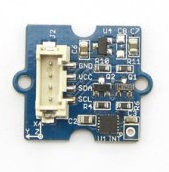MMA7660 Class
- ID: mma7660
- Name: I2C 3-axis Digital Accelerometer (1.5g)
- Other Names: Grove 3-Axis Digital Accelerometer (1.5g)
- Category: accelerometer
- Manufacturer: seeed
- Connection: i2c gpio
- Link: http://www.nxp.com/products/sensors/accelerometers/3-axis-accelerometers/1.5g-low-g-digital-accelerometer:MMA7660FC
UPM module for the MMA7660 I2C 3-axis digital accelerometer. This device supports a variety of capabilities, including the generation of interrupts for various conditions, tilt and basic gesture detection, and X/Y/Z-axis measurements of g-forces being applied (up to 1.5g)
This module was tested with the Grove 3-Axis Digital Accelerometer (1.5g)

Item Index
Methods
MMA7660
-
bus -
address
MMA7660 constructor
Parameters:
-
busNumberI2C bus to use
-
addressNumberAddress for this sensor; default is 0x55
Returns:
writeByte
-
reg -
byte
Writes a byte value into a register
Parameters:
-
regNumberRegister location to write into
-
byteNumberByte to write
Returns:
True if successful
readByte
-
reg
Reads a byte value from a register
Parameters:
-
regNumberRegister location to read from
Returns:
Value in a specified register
getRawValues
-
x -
y -
z
Reads the current value of conversion
Parameters:
-
xInt *Returned x value
-
yInt *Returned y value
-
zInt *Returned z value
getAcceleration
-
ax -
ay -
az
Gets the computed acceleration
Parameters:
-
axFloat *Returned computed acceleration of the X-axis
-
ayFloat *Returned computed acceleration of the Y-axis
-
azFloat *Returned computed acceleration of the Z-axis
getVerifiedAxis
-
axis
Reads an axis, verifying its validity. The value passed must be one of REG_XOUT, REG_YOUT, or REG_ZOUT.
Parameters:
-
axisMMA7660_REG_TAxis to read
Returns:
Axis value
getVerifiedTilt
()
Number
Reads the tilt register, verifying its validity
Returns:
Tilt value
setModeActive
()
Puts the device in the active mode. In this mode, register writes are not allowed. Place the device in the standby mode before attempting to write registers.
setModeStandby
()
Puts the device in the standby (power saving) mode. Note: when in the standby mode, there is no valid data in the registers. In addition, the only way to write a register is to put the device in the standby mode.
tiltBackFront
()
Number
Reads tiltBackFront bits
The value returned is one of the MMA7660_TILT_BF_T values
Returns:
Bits corresponding to the BackFront tilt status
tiltLandscapePortrait
()
Number
Reads tiltLandscapePortrait bits
The value returned is one of the MMA7660_TILT_LP_T values
Returns:
Bits corresponding to the LandscapePortrait tilt status
tiltTap
()
Boolean
Reads the tiltTap status
Returns:
True if a tap is detected
tiltShake
()
Boolean
Reads the tiltShake status
Returns:
True if a shake is detected
uninstallISR
()
Uninstalls the previously installed ISR
setInterruptBits
-
ibits
Enables interrupt generation based on passed interrupt bits. The bits are a bitmask of the requested MMA7660_INTR_T values. Note: the device must be in the standby mode to set this register.
Parameters:
-
ibitsNumberSets the requested interrupt bits
Returns:
True if successful
setSampleRate
-
sr
Sets the sampling rate of the sensor. The value supplied must be one of the MMA7660_AUTOSLEEP_T values.
Parameters:
-
srMMA7660_AUTOSLEEP_TOne of the MMA7660_AUTOSLEEP_T values
Returns:
True if successful
getAcceleration
()
Std::vector float
Reads the current acceleration values. The returned memory is statically allocated and will be overwritten on each call.
Returns:
std::vector containing x, y, z.
getRawValues
()
Std::vector int
Reads the current value of conversion. The returned memory is statically allocated and will be overwritten on each call.
Returns:
std::vector containing x, y, z.
installISR
-
pin -
isr -
arg
Installs an interrupt service routine (ISR) to be called when an interrupt occurs
Parameters:
-
pinNumberGPIO pin to use as the interrupt pin
-
isrFunctionPointer to a function to be called on interrupt
-
argVoid *Pointer to an object to be supplied as an argument to the ISR.